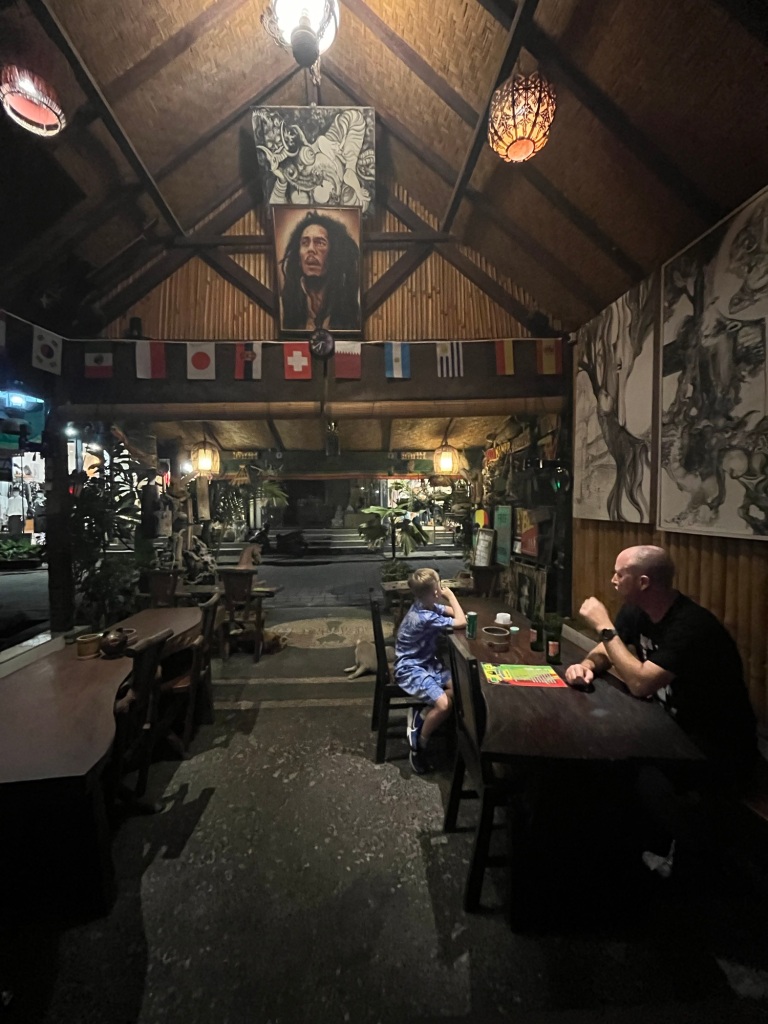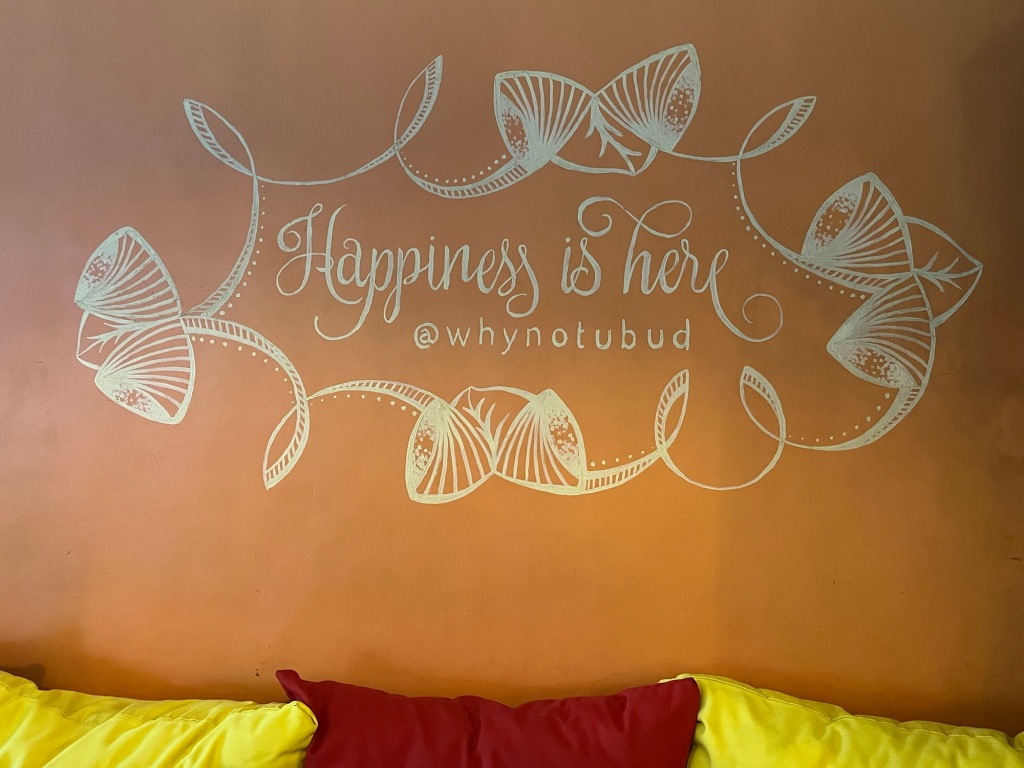It began when we took Tom to Bali as a one-year-old who’d just learnt to walk. Lee and I were frazzled first-time-parents and we gave each other the gift of Power Hour – one hour a day to do whatever you like with no interruptions. My precious hour was invariably spent in a spa getting a zen massage – whilst Lee mostly took himself off to a local warung to drink Bintang (his happy place).
On our third trip with Tom to Bali I’m pleased to say we’ve kept up the tradition – although now as an 8 year old he is pretty fun company and I’m able to take liberties with my Power Hour (2.5hr spa package here I come) and of course it works both ways!
So off Lee goes for his 60mins Balinese massage and Tom informs him beforehand he’d like some “mum time”, though his mouth opens in surprise when Lee teases “no problem mate, I’ll see you tomorrow”. After the massage, in true Lee-style, he finds a little warung with Bob Marley memorabilia on the wall and orders himself a Bintang, happy in his own company. After a few minutes the Balinese owner takes a seat next to him and starts making light conversation.

By the second Bintang the conversation turns to the changes the reggae-loving owner has seen in Ubud over the last 15 years, since he took over the warung from his father in 2009, who had taken over from his own father before him – feeding the local farming community for half a century. The owner explains how back in 2009 the place was surrounded by rice paddies – and now it is overrun with foreign-owned hotels and restaurants. Eventually he asks where Lee is staying and he sheepishly admits it’s down the road at the 5* Bisma Eight. The guy nods his head slowly with a different look now in his eye – “my wife works there” he says, “very nice, very expensive”. His wife is lucky to be in hotel hospitality he explains as it’s a job that pays more than most locals earn here. He then tells Lee our hotel is owned by an Indian family and Lee feels complicit in the commodification of Ubud that has taken over this man’s land and livelihood. Before Lee leaves the owner implores him to support the local warungs. Lee says his son Tom loves Bob Marley and we’ll be back before we leave Ubud.

That night as we sit on the rattan mat at Warung Ning across the road from the hotel, eating the delicious chicken satay and fried rice, we remark on how sad it is we are the only customers there during the whole meal (and they made relatively little from us as the food is so cheap). Lee is telling me about the other local-warung-owner as we watch the staff peeling lemongrass or on their phones, waiting patiently for customers. I can tell Lee feels bad. It’s that western “white” guilt when visiting a place with a depressed economy. I pose to Lee the idea that maybe they pity us tourists for having life all wrong, with our stressy jobs, high levels of obesity and mental health issues, just waiting for the two weeks a year where we allow ourselves to relax. Despite the lack of customers and presumably wealth the staff look pretty laid back to me.
The social researcher in me wants to do a survey about how the local people really feel about life on the island, more specifically their mental state of mind. My question driving this hypothetical research is not so much what is the secret to success, but what is the secret to happiness?
We know that success to some might look like wealth or the accumulation of assets, it might be high status, a senior job title or a fancy car. Success is often measured by external factors. Happiness on the other hand is surely more of an internal experience? The things that make us content and bring us peace. They can’t be bought or found in a shop necessarily (with the exception of chocolate perhaps).
I decide a survey of all the locals on measures of happiness is not feasible in the four nights we have remaining in Ubud, so instead I embark on a thought experiment. From my years of travel, interviewing people, my Ayurveda and psychology studies, all the philosophy I’ve read and the “wellness” crap I’ve done along the way, what is the secret to happiness? What are the key things that my knowledge, wisdom and intuition tells me are the foundations of being a happier human?
Some of these naturally cross over with the pillars of health, notably eating well. I truly believe we are what we eat and the closer to nature our food is the more vitality we feel. I also feel our body is designed to move – to circulate the blood and eliminate the toxins. These two things are great for brain health too – releasing natural endorphins – as is good sleep and hydration of course. But moving beyond the obvious pillars, we also need purpose – we need creative pursuits, it’s what humans were made from and made for – creation. Without this sense of purpose I think we can spiral into pointlessness and not knowing what life is for. It’s the fire in our bellies, the stuff that lights us up.
My observations over the last four decades have also led me to understand how important having a community and connection is for happiness. There’s nothing more heartwarming in life than finding your “tribe” – loved ones that look out for you and would be there at the drop of a hat, and a community you feel a sense of belonging to. It’s just part of our social make-up.
As I sit in the warung and look around I see the staff chatting to each other, laughing, part of their tribe. There’s a slower pace – they call it Bali time – nobody appears to be in a hurry. The locals visit the warungs for lunch, to eat a plate of food grown in the farms and rice paddies nearby. The women take the time to make beautiful floral offerings to their Hindu gods and give a blessing to Ganesha – a symbol of happiness. The offerings are also symbolic of the beauty that the Balinese seem to find in nature, which you can see all around, including the exquisite hand-carved furniture, majestic stone statues and gorgeous art galleries on every street. You also see this beauty in their dancing, the way they move their bodies with ease. The Balinese way of being is intentional, creative and kind – not too dissimilar to the art form of a Japanese tea ceremony, say. I feel a slight sense of embarrassment on behalf of the tourists who lumber around in their overt swimwear, drinking beers and gorging on all the cuisines imaginable – with no restraint, grace or reciprocity.
That’s not to diminish the sadness and stress that must come from watching the place you were born get over-developed or struggling to get enough customers to pay your bills. It’s certainly not to say life is easy for the average person here, or even to pass judgement on what is “right or wrong”. It’s merely a thought experiment – and as it comes to an end I wonder again about the foundations of happiness – eating fresh, movement, creative pursuits, a sense of purpose, community and belonging. I ponder how the Balinese appear to me to have these things in abundance.

As Lee points out though the Bali we see is mostly the tourist-side – and what about hope for a good future and knowing you and your family will be okay – isn’t that a big part of happiness? If their island is being taken over by international investors and jobs are hard to come by doesn’t the foundation that happiness is built on crumble? Though I counter that if you can be mostly happy in the present moment that is the source of the construct we call ‘future’. You could also argue that happiness is fleeting and it can’t be experienced at all times – some people talk about contentment instead, and maybe that’s what I’m really talking about. All these things are up for debate. Essentially I’m asking what makes life worth living??
If success is life’s focus then it suggests a pinnacle or peak; the highest point we need to work hard and strive to get to. On the other hand, if happiness or contentment is the intention then there is no end, it ebbs and flows, it evolves. There is nowhere (or no bank balance) to get to, it’s simply a state of being. For me, the secret to happiness distilled down to one lesson is that life is not a race (I refuse to use the J word here!). Life is the creative flow of everything that came before us and will continue long after we are gone, it’s the beauty we find in simplicity and in nature – and I think we could all catch a glimpse of this if we sit long enough in a local Balinese warung beneath a photo of the owner’s grandfather who fed the local farmers amongst the rice paddies all those years ago.

